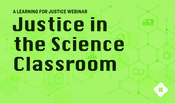In our kindergarten classroom, there are no desks. Instead, we have three large, child-sized tables, around which 20 children and three teachers can fit. We call it the writing table. Here, students can draw, write and complete phonics-based workbooks. One morning, Greta was drawing a picture of something that had happened the day before: She and her friend Lily had made bird nests during outside recess and had placed them all throughout the yard. Greta was illustrating herself and Lily making nests. Her classmate Ellie watched her create the drawing.


